初中英语语法从句讲解
初中英语语法从句
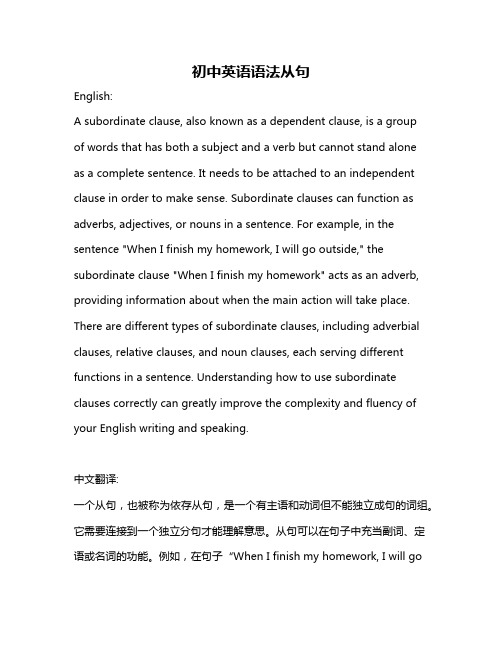
初中英语语法从句English:A subordinate clause, also known as a dependent clause, is a groupof words that has both a subject and a verb but cannot stand aloneas a complete sentence. It needs to be attached to an independent clause in order to make sense. Subordinate clauses can function as adverbs, adjectives, or nouns in a sentence. For example, in the sentence "When I finish my homework, I will go outside," the subordinate clause "When I finish my homework" acts as an adverb, providing information about when the main action will take place. There are different types of subordinate clauses, including adverbial clauses, relative clauses, and noun clauses, each serving different functions in a sentence. Understanding how to use subordinate clauses correctly can greatly improve the complexity and fluency of your English writing and speaking.中文翻译:一个从句,也被称为依存从句,是一个有主语和动词但不能独立成句的词组。
(精华版)初中英语语法基本从句汇总
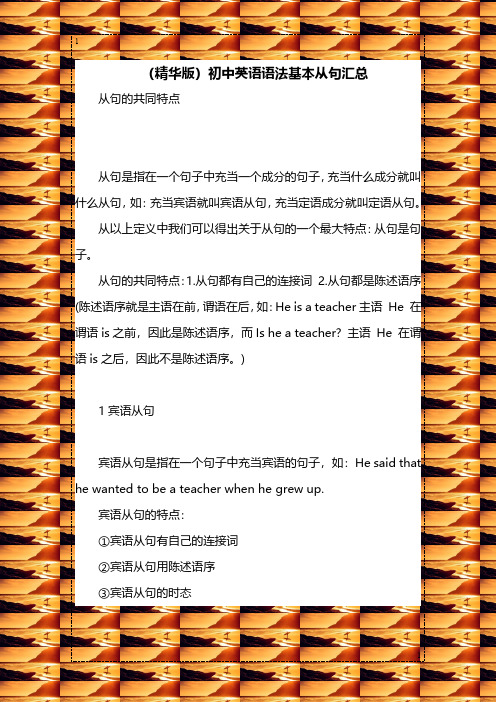
(精华版)初中英语语法基本从句汇总从句的共同特点从句是指在一个句子中充当一个成分的句子,充当什么成分就叫什么从句,如:充当宾语就叫宾语从句,充当定语成分就叫定语从句。
从以上定义中我们可以得出关于从句的一个最大特点:从句是句子。
从句的共同特点:1.从句都有自己的连接词2.从句都是陈述语序(陈述语序就是主语在前,谓语在后,如:He is a teacher主语He在谓语is之前,因此是陈述语序,而Is he a teacher?主语He在谓语is之后,因此不是陈述语序。
)1宾语从句宾语从句是指在一个句子中充当宾语的句子,如:He said that he wanted to be a teacher when he grew up.宾语从句的特点:①宾语从句有自己的连接词②宾语从句用陈述语序③宾语从句的时态①宾语从句的连接词:宾语从句的连接词包括that、if/whether(是否)、特殊疑问词。
②宾语从句的语序;A.宾语从句的连接词后加陈述语序(主语在前,谓语在后),如:I want to know if he can come tomorrowB.当连接词本身又是宾语从句的主语时,后面直接加谓语动词,如:She asked me who had helped him.③宾语从句的时态,只要记住以下口诀就可以了“主现则从任,主过则从过,客观真理一般现”A.主现则从任:主句如果是一般现在时,则从句根据时间状语需要从八种时态中任选一种,如:1.He tells me he likes English very much(一般现在时)B.主过则从过:主句如果是一般过去时,则从句根据时间状语需要从四种带“过”字的时态中任选一种,带“过”字的时态分别是如:一般过去时,过去进行时,过去将来时,过去完成时。
如:He told me that he liked playing football(一般过去时)C.客观真理一般现:客观真理永远用一般现在时。
初中英语语法——三大从句汇总(重点笔记)
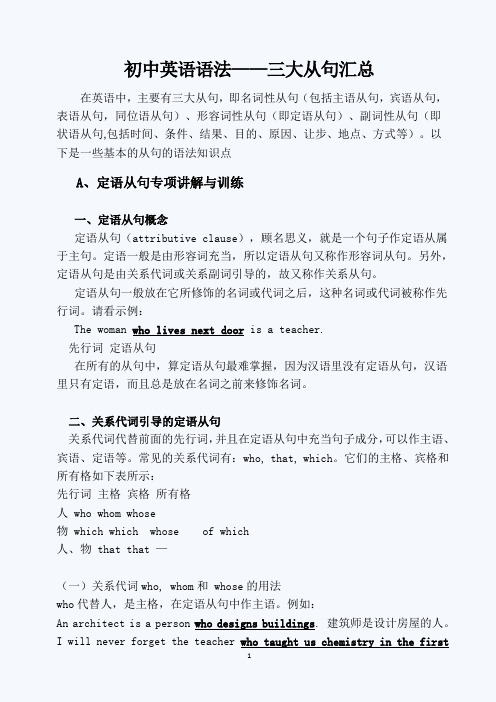
初中英语语法——三大从句汇总在英语中,主要有三大从句,即名词性从句(包括主语从句,宾语从句,表语从句,同位语从句)、形容词性从句(即定语从句)、副词性从句(即状语从句,包括时间、条件、结果、目的、原因、让步、地点、方式等)。
以下是一些基本的从句的语法知识点A、定语从句专项讲解与训练一、定语从句概念定语从句(attributive clause),顾名思义,就是一个句子作定语从属于主句。
定语一般是由形容词充当,所以定语从句又称作形容词从句。
另外,定语从句是由关系代词或关系副词引导的,故又称作关系从句。
定语从句一般放在它所修饰的名词或代词之后,这种名词或代词被称作先行词。
请看示例:The woman who lives next door is a teacher.先行词定语从句在所有的从句中,算定语从句最难掌握,因为汉语里没有定语从句,汉语里只有定语,而且总是放在名词之前来修饰名词。
二、关系代词引导的定语从句关系代词代替前面的先行词,并且在定语从句中充当句子成分,可以作主语、宾语、定语等。
常见的关系代词有:who, that, which。
它们的主格、宾格和所有格如下表所示:先行词主格宾格所有格人 who whom whose物 which which whose of which人、物 that that —(一)关系代词who, whom和 whose的用法who代替人,是主格,在定语从句中作主语。
例如:An architect is a person who designs buildings. 建筑师是设计房屋的人。
I will never forget the teacher who taught us chemistry in the firstyear of my senior middle school.我将永远不会忘记在高一时教我们化学的那位老师。
Anyone who wants to apply for this job must send us the resume by email first. 想应聘这个职位的任何人都必须先通过电子邮件向我们发送简历。
初中英语语法之定语从句
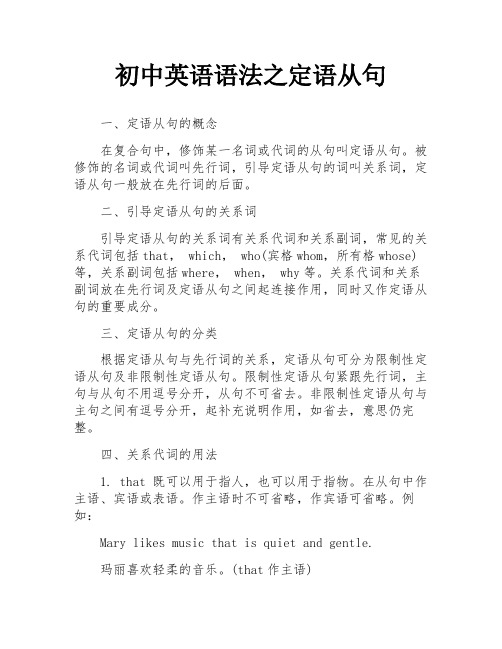
初中英语语法之定语从句一、定语从句的概念在复合句中,修饰某一名词或代词的从句叫定语从句。
被修饰的名词或代词叫先行词,引导定语从句的词叫关系词,定语从句一般放在先行词的后面。
二、引导定语从句的关系词引导定语从句的关系词有关系代词和关系副词,常见的关系代词包括that, which, who(宾格whom,所有格whose)等,关系副词包括where, when, why等。
关系代词和关系副词放在先行词及定语从句之间起连接作用,同时又作定语从句的重要成分。
三、定语从句的分类根据定语从句与先行词的关系,定语从句可分为限制性定语从句及非限制性定语从句。
限制性定语从句紧跟先行词,主句与从句不用逗号分开,从句不可省去。
非限制性定语从句与主句之间有逗号分开,起补充说明作用,如省去,意思仍完整。
四、关系代词的用法1. that 既可以用于指人,也可以用于指物。
在从句中作主语、宾语或表语。
作主语时不可省略,作宾语可省略。
例如:Mary likes music that is quiet and gentle.玛丽喜欢轻柔的音乐。
(that作主语)The coat (that) I put on the desk is blue.我放在桌子上的那件外套是蓝色的。
(that作宾语)2.which用于指物,在句中作主语、宾语或表语。
作主语不可省略,作宾语可省略。
例如:The building which stands near the train station is a supermarket.位于火车站附近的那座大楼是一家超市。
(作主语)The film (which) we saw last night was wonderful.我们昨天晚上看的那部电影很好看。
(作宾语)3.who, whom用于指人,who 用作主语,whom用作宾语。
在口语中,有时可用who代替whom。
who和whom作宾语时也可省略。
例如:The girl who often helps me with my English is from England.经常在英语方面帮助我的那个女孩是英国人。
初中英语语法——定语从句用法总结归纳
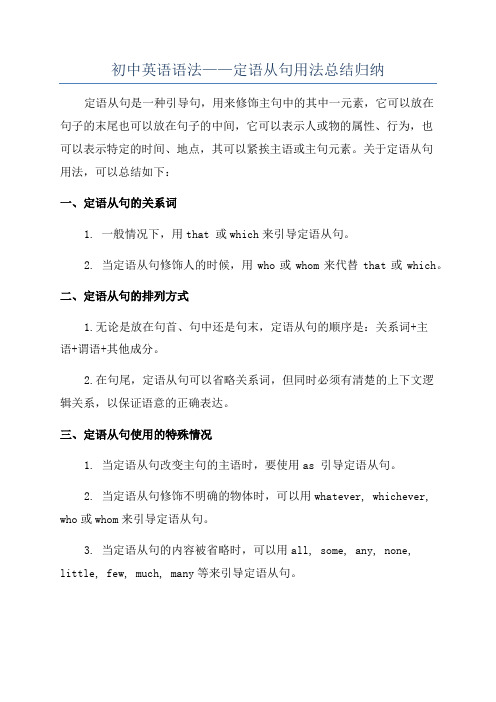
初中英语语法——定语从句用法总结归纳定语从句是一种引导句,用来修饰主句中的其中一元素,它可以放在
句子的末尾也可以放在句子的中间,它可以表示人或物的属性、行为,也
可以表示特定的时间、地点,其可以紧挨主语或主句元素。
关于定语从句
用法,可以总结如下:
一、定语从句的关系词
1. 一般情况下,用that 或which来引导定语从句。
2. 当定语从句修饰人的时候,用who或whom来代替that或which。
二、定语从句的排列方式
1.无论是放在句首、句中还是句末,定语从句的顺序是:关系词+主
语+谓语+其他成分。
2.在句尾,定语从句可以省略关系词,但同时必须有清楚的上下文逻
辑关系,以保证语意的正确表达。
三、定语从句使用的特殊情况
1. 当定语从句改变主句的主语时,要使用as 引导定语从句。
2. 当定语从句修饰不明确的物体时,可以用whatever, whichever, who或whom来引导定语从句。
3. 当定语从句的内容被省略时,可以用all, some, any, none, little, few, much, many等来引导定语从句。
初中英语语法三大从句总结,仅此一份,建议收藏!

在初中英语中,主要有三大从句,即宾语从句、定语从句、状语从句(包括时间、条件、结果、目的、原因、让步、地点、方式等)。
小编今天跟大家分享的就是这三个从句的主要语法点,赶快看起来吧!宾语从句一、定义在句子中起宾语作用的从句叫做宾语从句。
二、连接词that: I think that you can pass the exam.Whether/if: I don’t know what the word means.“Wh”: I don’t know what the word means.I don’t know where he found the book.只用whether的情况:1. 与or not连用:I don’t know whether it’s raining or not.2. 与动词不定式连用:He doesn’t know whether to accept the invitation.3. 连接词前有介词时:It depends on whether he is coming.三、时态1. 主句是一般现在时态,从句根据实际情况而定(各种时态均可)She wants to know what he has done for the exam.2.主句是一般过去时态,从句用相应的过去的时态。
1)She said that she was a student.2)She said that she would fly to Japan in a week.3)She said that she had finished her homework already.3. 如果宾语从句说的是客观真理、自然现象或事实时,这时宾语从句要用一般现在时态。
The teacher said that the earth goes round the sun.一、定义在复合句中修饰名词、代词的从句叫定语从句。
初中英语语法——三大从句汇总(重点笔记)

初中英语语法——三大从句汇总A、定语从句专项讲解与训练一、定语从句概念定语从句(attributive clause),顾名思义,就是一个句子作定语从属于主句。
定语一般是由形容词充当,所以定语从句又称作形容词从句。
另外,定语从句是由关系代词或关系副词引导的,故又称作关系从句。
定语从句一般放在它所修饰的名词或代词之后,这种名词或代词被称作先行词。
请看示例:The woman who lives next door is a teacher.先行词定语从句在所有的从句中,算定语从句最难掌握,因为汉语里没有定语从句,汉语里只有定语,而且总是放在名词之前来修饰名词。
二、关系代词引导的定语从句关系代词代替前面的先行词,并且在定语从句中充当句子成分,可以作主语、宾语、定语等。
常见的关系代词有:who, that, which。
它们的主格、宾格和所有格如下表所示:先行词主格宾格所有格人 who whom whose物 which which whose of which人、物 that that —(一)关系代词who, whom和 whose的用法who代替人,是主格,在定语从句中作主语。
例如:An architect is a person who designs buildings. 建筑师是设计房屋的人。
I will never forget the teacher who taught us chemistry in the first year of my senior middle school.我将永远不会忘记在高一时教我们化学的那位老师。
Anyone who wants to apply for this job must send us the resume by email first. 想应聘这个职位的任何人都必须先通过电子邮件向我们发送简历。
whom代替人,是宾格,在定语从句作宾语,在非正式英语常可省略。
初中英语语法:宾语从句

初中英语语法:宾语从句考察的三个要点:语序,时态,关联词。
1.定义:用作宾语的从句叫宾语从句。
2.构成:关联词+简单句。
3宾语从句的语序一定是陈述句语序。
(who作主语的从句本身就是陈述句语序)4宾语从句在复合句中作主句的宾语,连接宾语从句的连词有that(that在口语中常省略)。
whether,if,和连接代词what,which,who,whom及连接副词when,where,how,why。
He knew(that)he should study hard.他知道他应该努力学习。
Can you tell me which class you are in?您能告诉我,您在哪一班吗?He asked me if he could come in,他问我他是否能进来。
5.引导宾语从句的关联词有三类:(1)从属连词that.如:一般那情况下能够省略。
He told us that he felt ill.I know he has returned.注:that在引导宾语从句时也并不是任何情况下都能够省略。
在以下情况下,that不能省略。
1.Everybody could see what happened and that Tom wasfrightened.(and连接两个宾语从句,that宾语从句放在and的后面时,that不能省略。
)2.I know nothing about him except that he is from thesouth.(that引导的宾语从句作介词宾语时,that不能省略。
)3.That he ever said such a thing I simply don’t believe.(that从句位于句首时,that不可省略。
)我简直不相信他曾说过这样的话。
(2)从属连词if/whether.如:I doubt whether he will succeed.I don’t know if you can help me.(3)连接代词who,whom,whose,what,which,whoever,whatever,whichever连接副词where,when,how,why.Who or what he was,Martin never learned.I wonder what he’s writing to me about.I’ll tell you why I asked you to come.。
- 1、下载文档前请自行甄别文档内容的完整性,平台不提供额外的编辑、内容补充、找答案等附加服务。
- 2、"仅部分预览"的文档,不可在线预览部分如存在完整性等问题,可反馈申请退款(可完整预览的文档不适用该条件!)。
- 3、如文档侵犯您的权益,请联系客服反馈,我们会尽快为您处理(人工客服工作时间:9:00-18:30)。
初中英语语法——三大从句汇总在英语中,主要有三大从句,即名词性从句(包括主语从句,宾语从句,表语从句,同位语从句)、形容词性从句(即定语从句)、副词性从句(即状语从句,包括时间、条件、结果、目的、原因、让步、地点、方式等)。
以下是一些基本的从句知识点A、定语从句专项讲解与训练一、定语从句概念定语从句(attributive clause),顾名思义,就是一个句子作定语从属于主句。
定语一般是由形容词充当,所以定语从句又称作形容词从句。
另外,定语从句是由关系代词或关系副词引导的,故又称作关系从句。
关系词常有3个作用:1,引导定语从句。
2,代替先行词。
3,在定语从句中担当一个成分。
定语从句一般放在它所修饰的名词或代词之后,这种名词或代词被称作先行词。
请看示例:The woman who lives next door is a teacher.先行词定语从句在所有的从句中,算定语从句最难掌握,因为汉语里没有定语从句,汉语里只有定语,而且总是放在名词之前来修饰名词。
二、关系代词引导的定语从句关系代词代替前面的先行词,并且在定语从句中充当句子成分,可以作主语、宾语、定语等。
常见的关系代词有:who, that, which。
它们的主格、宾格和所有格如下表所示:格先行词主格宾格所有格人who whom whose物which which whose 、of which人、物that that —(一)关系代词who, whom和whose的用法1)who代替人,是主格,在定语从句中作主语。
例如:An architect is a person who designs buildings. 建筑师是设计房屋的人。
I will never forget the teacher who taught us chemistry in the first year of my senior middle school. 我将永远不会忘记在高一时教我们化学的那位老师。
Anyone who wants to apply for this job must send us the resume by email first. 想应聘这个职位的任何人都必须先通过电子邮件向我们发送简历。
2)whom代替人,是宾格,在定语从句作宾语,在非正式英语常可省略。
例如:Do you know the gentleman whom we met in the school library yesterday? 昨天我们在学校图书馆里遇到的那位先生你认识吗?This is the student whom my father taught ten years ago. 这是我爸爸十年前教的学生。
The girl who I saw is called Mary. 我见到的那个女孩名叫玛丽。
(在非正式英语中,主格who代替了宾格whom,亦可省略)3)whose一般代替人,有时亦可代替物,是所有格,在定语从句作定语。
例如:The girl student whose father is a senior engineer used to study abroad.其父是一位高级工程师的那个女学生过去在国外留学。
Do you know the name of the hotel whose window we can see here? 我们这儿能看到窗户的那个宾馆叫什么名字,你知道吗?(关系代词whose指代先行词hotel,正式用法应该用of which。
whose window=the window of which,意思是:the window of the hotel。
)(二)关系代词which的用法which代替物,在定语从句作主语或宾语,作宾语时还可省略。
例如:I do not like stories which have unhappy endings.我不喜欢有不幸结局的小说。
(which可以换成that)Tom works for a factory which makes watches.汤姆在一个制表厂工作。
(which可以换成that)(三)关系代词that的用法that既可指人又可指物,在当代英语中大多指物,在定语从句作主语或宾语,作宾语时还可省略。
例如:Is she the girl that sells newspapers?她是卖报纸的那个女孩吗?(that可以换成who)Where is the ice-cream that was in the fridge?放在冰箱的冰激凌哪儿去了?(that可以换成which)Is this the book that you want to buy?这是你要买的那本书吗?(that可以换成which,在定语从句作宾语,还可以省略)三.介词+关系代词引导的定语从句关系代词在定语从句中做介词宾语时,从句常由介词+关系代词引导(1) the school (that/which) he once studied in is very famous.(2) the school in which he once studied is very famous.(3) tomorrow i will bring here a magazine (that/which) you asked for.(4) tomorrow i will bring here a magazine for which you asked.(5) we'll go to hear the famous singer (whom/that/who) we have often talked about.(6) we'll go to hear the famous singer about whom we have often talked.注意:1. 含有介词的动词短语一般不拆开使用,如:look for, look after, take care of等(1) this is the watch which/that i am looking for. (t)(2) this is the watch for which i am looking. (f)2. 若介词放在关系代词前,关系代词指人时用whom,不可用who或者that;指物时用which,不能用that;关系代词是所有格时用whose(1) the man with whom you talked is my friend. (t)(2) the man who/that you talked with is my friend. (f)(3) the plane in which we flew to canada is very comfortable. (t)(4) the plane in that we flew in to canada is very comfortable. (f)3.“介词+关系代词”前可有some, any, none, both, all, neither, most, each, few等代词或者数词(1) he loved his parents deeply, both of whom are very kind to him.(2) in the basket there are quite many apples, some of which have gonebad.(3) there are forty students in our class in all, most of whom are from big cities.解答"介词+关系代词"类型的定语从句题时,关键在于分析定语从句中的谓语动词(该动词是不及物动词)习惯上常与什么介词搭配使用。
这就需要同学们在平时学习时要注重某些不及物动词和介词惯用的情形,并要灵活运用。
例如:in the dark street, there wasn't a single person ________ she could turn for help.a. thatb. whoc. from whomd. to whom简析:本题定语从句中的turn 与介词to 构成固定短语"turn to sb. for help (向某人求助)"。
所以,d是正确选项。
四、关系副词引导的定语从句常用的关系副词只有三个:when, where, why,在定语从句中充当时间、地点和原因状语。
它们的用法大家不妨记住一个口诀:the time whenthe place wherethe reason why(一)关系副词when的用法关系副词when代替的先行词表示的是时间,when在定语从句作时间状语。
例如:In Beijing July and August are the months when it rains very often.北京的七月和八月是常下雨的月份。
(when先行词是months)Do you remember the day when we first went to the Summer Palace?你还记得我们第一次去颐和园的那一天吗?(when先行词是day,当代英语里when可以用that替代,这时关系代词that就变成了表示时间的关系副词)I haven’t seen her since the year when I left Tokyo.自从我离开东京的那一年我就一直没见到过她。
(when先行词是year,同样when可以用that代替)(二)关系副词where的用法关系副词where代替的先行词表示的是地点,where在定语从句作地点状语。
例如:During the Spring Festival I went back to the town where I was brought up. 春节期间,我回到了生我养我的家乡。
(where的先行词是town)This is the place where Li Bai once lived.这是李白曾经生活过的地方。
(where先行词是place)上面这个句子不可以将where改为that,因为that不能作为表示地点的关系副词。
试比较下句:This is the place that Li Bai once visited.这是李白曾经游览过的地方。
